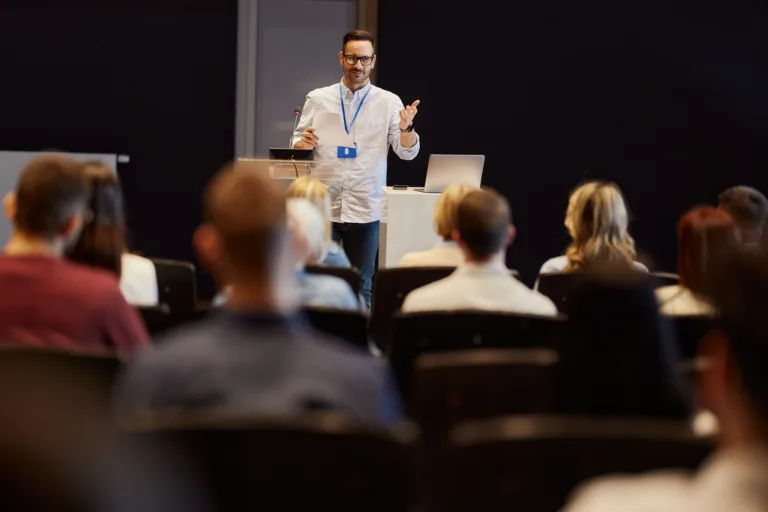Life Sciences Event Marketing: 7 Strategies for Success

In today's rapidly evolving biotech landscape, industry conferences remain crucial networking and business development hubs, with in-person events making a strong comeback in 2025.
For life sciences marketing professionals, conferences represent unique opportunities to showcase innovations, connect with decision-makers, and generate high-quality leads.
This guide presents seven proven strategies for maximizing your conference presence:
- Pre-event planning and promotion
- Creating engaging booth experiences
- Content strategy development
- Lead generation optimization
- Day(s) of show planning
- Networking and partnership-building
- Digital integration
- Post-event optimization
Strategy 1: How to Promote Your Life Sciences Conference Presence
Successful life sciences event marketing begins months before the conference.
Timeline Development
- 5 months out: Strategy development and budget allocation
- 4 months out: Content creation and booth design
- 2 months out: Digital promotion launch
- 1 month out: Team training and final preparations
Digital Promotion Best Practices
- Create event-specific landing pages
- Develop email nurture campaigns
- Real-world example: L7 Creative worked with Veatch Ophthalmic Instruments and Supplies to create email campaigns that encouraged sign-ups to their upcoming trade show, advertised their booth, and offered an incentive for attending through a giveaway.
- Launch LinkedIn targeted ads
- Utilize industry-specific platforms
Audience Targeting
Focus on these key segments:
- Decision-makers (C-suite, Directors)
- Technical buyers
- Research leads
- Potential partners
Strategy 2: Biotech Trade Show Booth Strategies: How to Stand Out at Life Sciences Events
Your booth serves as your conference hub. Leading biotech companies create immersive experiences that blend technology with personal interaction.
Interactive Display Elements
- Virtual reality product demonstrations
- Interactive touchscreen presentations
- Live experiment stations
- Digital poster sessions
- Giveaways
- Real-world example: L7 Creative developed a giveaway with Veatch Ophthalmic Instruments and Supplies where attendees of their presentation had the chance to win a free tablet. Winners would then take pictures with our custom sign, helping to generate buzz and drive traffic to Veatch’s booth.
Technology Integration
Implement:
- QR codes for instant information access
- Mobile-friendly product catalogs
- Real-time demonstration scheduling
- Digital lead capture systems
Space Optimization
- Clear traffic flow patterns
- Private meeting areas
- Product showcase zones
- Interactive spaces
Best practices for staff training:
- Product knowledge certification
- Role-specific training
- Lead qualification protocols
- Customer interaction guidelines
Strategy 3: Content Strategy for Events
Your life sciences marketing content strategy must align with both in-person and digital touchpoints.
Essential Content Elements
Presentation Materials:
- Technical slide decks
- Product demonstration videos
- Scientific posters
- Research summaries
- Clinical data presentations
- Real-world example
- When Gen-Probe partnered with L7 Creative, they needed to expand their global reach in the molecular diagnostics and health industries. Our tailored event strategy, covering messaging, branding, and trade show collateral, helped position them as an industry leader. The result? A $3.8 billion acquisition by Hologic.
Digital Content:
- Mobile-optimized product sheets
- Interactive case studies
- Virtual reality demos
- Technical specifications
- Research documentation
Content Distribution Strategy
- Pre-event content:
- Teaser videos
- Registration incentives
- Preview materials
- During event:
- Live demonstrations
- Real-time social updates
- Digital handouts
- Post-event:
- Follow-up materials
- Presentation recordings
- Technical documentation
Strategy 4: Biotech Lead Capture: How to Convert Conference Attendees into Clients
Effective biotech marketing at events requires sophisticated lead capture systems.
Data Collection Best Practices
- Digital badge scanning
- Mobile lead forms
- Meeting scheduling apps
- Business card digitization
- Real-time qualification tools
Lead Qualification Framework
Score leads based on:
- Purchase timeline
- Budget authority
- Technical requirements
- Decision-making role
- Project scope
CRM Integration
Implement:
- Real-time data sync
- Automated follow-up triggers
- Lead scoring automation
- Territory assignment
- Activity tracking
Strategy 5: Networking and Partnership Development
Strategic networking at life sciences events can accelerate growth.
Meeting Management
- Pre-schedule key meetings
- Use digital scheduling tools
- Create meeting briefs
- Set clear objectives
- Track outcomes
- Physical invitations
- Real-world example: L7 Creative worked with Veatch Ophthalmic Instruments and Supplies to hand out invitations at trade shows to visit Veatch’s booth.
Partnership Development
Focus areas:
- Research collaborations
- Distribution agreements
- Technology licensing
- Co-development opportunities
- Market access partnerships
Strategy 6: Digital Integration Strategies
Modern life sciences marketing demands seamless digital integration at events.
Digital Engagement Tools
- Event-specific mobile app
- Virtual booth tours
- Digital product catalogs
- Interactive presentations
- Live polling systems
Social Media Strategy
- Live event updates
- Behind-the-scenes content
- Expert interviews
- Product launches
- Research highlights
Analytics and Tracking
Track key metrics:
- Digital engagement rates
- Content downloads
- Virtual booth visits
- Live stream viewers
- Social media reach
Strategy 7: Post-Event Optimization
Post-event activities significantly impact ROI. Leads contacted within 48 hours of an event are 7x more likely to convert than those followed up with weeks later.
Lead Nurturing Framework
- Immediate follow-up (24 hours)
- Content-based nurturing
- Personalized outreach
- Technical deep dives
- Sales team handoff
Content Repurposing
Transform event content into:
- Webinar series
- Technical blogs
- Case studies
- Social media content
- Email campaigns
Performance Analysis
Measure:
- Lead quality metrics
- Engagement rates
- Meeting outcomes
- Partnership development
- Revenue impact
Conclusion
Successful life sciences event marketing requires strategic planning, digital integration, and systematic follow-up.
Key implementation tips:
- Start planning 3-4 months ahead
- Focus on integrated digital experiences
- Prioritize data collection and analysis
- Maintain consistent follow-up
Want to dominate your next biotech conference? L7 Creative specializes in life sciences event marketing. Contact us for a customized strategy that maximizes leads and ROI.
Resources
- Momencio. (2025). Event ROI measurement made simple and effective. Momencio. https://www.momencio.com/event-roi-measurement-made-simple-and-effective/